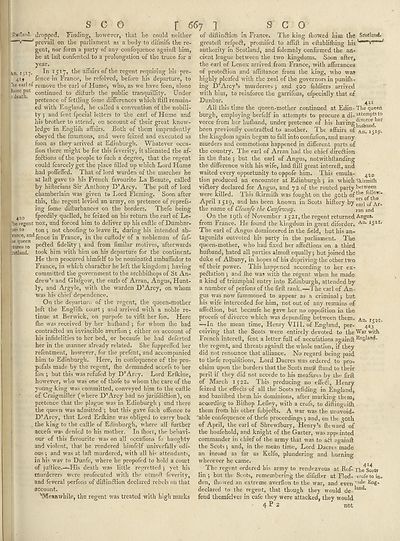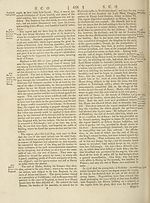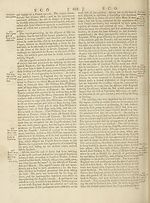Encyclopaedia Britannica, or, a Dictionary of arts, sciences, and miscellaneous literature : enlarged and improved. Illustrated with nearly six hundred engravings > Volume 18, RHI-SCR
(705) Page 667
Download files
Complete book:
Individual page:
Thumbnail gallery: Grid view | List view

SCO
i ic queen
s :tur<u to
cotland.
Tc<»t!an<*. dropped. Finding, however, that he could neither
prevail on the parliament as a body to difmifs the re¬
gent, nor form a party of any confequence againft him,
he at laft confented to a prolongation of the truce for a
year.
^ In 1517, the affairs of the regent requiring his pre-
41^ fence in France, he refolved, before his departure, to
Tie earl ot remove the earl of Hume, who, as we have feen, alone
|u”^Ut continued to dilturb the public tranquillity. Under
pretence of fettling fome differences which ftill remain¬
ed with England, he called a convention of the nobili¬
ty ; and fent fpecial letters to the earl of Hume and
his brother to attend, on account of their great know¬
ledge in Engliih affairs. Both of them imprudently
obeyed the fummons, and were feized and executed as
foon as they arrived at Edinburgh. Whatever occa-
fion there might be for this feverity, it alienated the af¬
fections of the people to fuch a degree, that the regent
could fcarcely get the place filled up which Lord Hume
had poffeffed. That of lord warden of the marches he
at laft gave to his French favourite La Beaute, called
by hiitorians Sir Anthony D’Arcy. The poll; of lord
chamberlain was given t« Lord Fleming. Soon after
this, the regent levied an army, on pretence of reprefs-
ing fome difturbances on the borders. Thefe being
^20 fpeedily quelled, he feized on his return the earl of Le-
!he regent riox, and forced him to deliver up his caftle of Dumbar-
jes to ton ; not choofing to leave it, during his intended ab-
fence in France, in the cuftody of a nobleman of fuf-
peded fidelity j and from fimilar motives, afterwards
took him with him on his departure for the continent.
He then procured himfelf to be nominated ambaffador to
France, in which chara&er he left the kingdom*, having
committed the government to the archbilhops of St An¬
drew’s and Glafgow, the earls of Arran, Angus, Hunt-
ly, and Argyle, with the warden D’Arcy, on whom
was his chief dependence.
On the departure of the regent, the queen-mother
left the Englifh court ; and arrived with a noble re¬
tinue at Berwick, on purpofe to vifit her fon. Here
{be was received by her hufband j for whom {lie had
contracted an invincible averfion ; either on account of
bis infidelities to her bed, or becaufe he had deferted
her in the manner already related. She fuppreffed her
refentment, however, for the prefent, and accompanied
him to Edinburgh. Here, in confequence of the pro*
pofals made by the regent, file demanded accefs to her
fon ; but this was refufed by D’Arcy. Lord Erfldne,
however, who was one of thofe to whom the care of the
young king was committed, conveyed him to the caftle
of Craigmiller (where D’Arcy had no jurifdiCtion), on
pretence that the plague was in Edinburgh 5 and there
the queen was admitted *, but this gave fuch offence to
D’Arcy, that Lord Erfkine was obliged to carry back
. the king to the caftle of Edinburgh, where all further
accefs wa^ dented to his mother. In ftiort, the behavi¬
our of this favourite was on all occafions fo haughty
and violent, that he rendered himfelf univerfally odi¬
ous ; and was at laft murdered, with all hh attendants,
in his wav to Dunfe, where he propofed to hold a court
of juftice.—His death was little regretted ; yet his
murderers Were profecuted with the utmoft feverity,
and feveral perfons of diftinCIion declared rebels on that
account.
vMeanwhile, the regent was treated with high marks
F 667 ]
SCO
of dill in ft ion in France. The king th o'Wed him the Scotland
greateft: refpeft, promifed to affift in eftablifhing his' 7' '
authority in Scotland, and folemnly confirmed the an¬
cient league between the two kingdoms. Soon after,
the earl of Lenox arrived from France, with affurances
of proteftion and aftitlance from the king, who was
highly pleafed with the zeal of the governors in punilh-
ing D’Arcy’s murderers j and 500 foldiers arrived
with him, to reinforce the garrifons, efpecially that of
Dunbar. ^2I
All this time the queen-mother continued at Edin-The queen
burgh, employing herfclf in attempts to procure a di-attemPts t0
vorce from her hufband, under pretence of his having ^
been previoufly contrafted to another. The affairs of An. 15'ip.
the kingdom again began to fall into confufion, and many
murders and commotions happened in different parts of
the country. The earl of Arran had the chief direftion
in the ftate j but the earl of Angus, notwithllanding
the difference with his wife, had ftill great intereft, and
waited every opportunity to oppofe him. This emula- 422.
tion produced an encounter at Edinburgh $ in which Skirmifti
viftory declared for Angus, and 72 of the routed party between
were killed. This fldrmilh was fought on the 30th /f'tho '
April 1519, and has been known in Scots hiftory by eaiq0f Ar-
the name of Cleanfe the Cattfewuy. ran and
On the 19th of November 1521, the regent returned Angus,
from France. He found the kingdom in great diforder. An* I521,
The earl of Angus domineered in the field, but his an-
tagonifts outvoted his party in the parliament. The
queen-mother, who had fixed her affeftions on a third
hulband, hated all parties almofi; equally j but joined the
duke of Albany, in hopes of his depriving the other twro
of their power. This happened according to her ex-
peftation; and Ihe was with the regent when he made
a kind of triumphal entry into Edinburgh, attended by
a number of perfons of the firft rank.—The earl of An¬
gus was now fummoned to appear as a criminal; but
his wife interceded for him, not out of any remains of
affeftion, but becaufe he gave her no oppofition in the
procefs of divorce which was depending between them.
-—In the mean time, Henry VIII. of England, per¬
ceiving that the Scots were entirely devoted to the War with
French intereft, fent a letter full of accufations againft En§land-
the regent, and threats againft the whole nation, if they
did not renounce that alliance. No regard being paid
to thefe requifitions, Lord Dacres was ordered to pro¬
claim upon the borders that the Scots muft {land to their
peril if they did not accede to his meafures by the firft
of March 1522. This producing no effeft, Henry
feized the effefts of all the Scots refiding in England,
and baniftred them his dominions, after marking them,
according to Biftiop Lefley, with a crofs, to diftinguifti
them from his other fubjefts. A war was the unavoid¬
able confequence of thefe proceedings *, and, on the 30th
of April, the earl of Sbrewfbury, Henry’s fttward of
the houfehold, and knight of the Garter, was app< inted
commander in chief of the army that was to aft againft
the Scots j and, in the mean time, Lord Dacres made
an inroad as far as Kelfo, plundering and burning
wherever he came.
The regent ordered his army to rendezvous at Rof- Th^Scots
lin ; but the Scots, remembering the difafter at Flod- etufeto in-
den, ftiowed an extreme averfion to the war, and evenEng*
declared to the regent, that though they would de- lantl*
fend themfelves in cafe they were attacked, they would
4P2 not
An. X52‘2.
4*3
i ic queen
s :tur<u to
cotland.
Tc<»t!an<*. dropped. Finding, however, that he could neither
prevail on the parliament as a body to difmifs the re¬
gent, nor form a party of any confequence againft him,
he at laft confented to a prolongation of the truce for a
year.
^ In 1517, the affairs of the regent requiring his pre-
41^ fence in France, he refolved, before his departure, to
Tie earl ot remove the earl of Hume, who, as we have feen, alone
|u”^Ut continued to dilturb the public tranquillity. Under
pretence of fettling fome differences which ftill remain¬
ed with England, he called a convention of the nobili¬
ty ; and fent fpecial letters to the earl of Hume and
his brother to attend, on account of their great know¬
ledge in Engliih affairs. Both of them imprudently
obeyed the fummons, and were feized and executed as
foon as they arrived at Edinburgh. Whatever occa-
fion there might be for this feverity, it alienated the af¬
fections of the people to fuch a degree, that the regent
could fcarcely get the place filled up which Lord Hume
had poffeffed. That of lord warden of the marches he
at laft gave to his French favourite La Beaute, called
by hiitorians Sir Anthony D’Arcy. The poll; of lord
chamberlain was given t« Lord Fleming. Soon after
this, the regent levied an army, on pretence of reprefs-
ing fome difturbances on the borders. Thefe being
^20 fpeedily quelled, he feized on his return the earl of Le-
!he regent riox, and forced him to deliver up his caftle of Dumbar-
jes to ton ; not choofing to leave it, during his intended ab-
fence in France, in the cuftody of a nobleman of fuf-
peded fidelity j and from fimilar motives, afterwards
took him with him on his departure for the continent.
He then procured himfelf to be nominated ambaffador to
France, in which chara&er he left the kingdom*, having
committed the government to the archbilhops of St An¬
drew’s and Glafgow, the earls of Arran, Angus, Hunt-
ly, and Argyle, with the warden D’Arcy, on whom
was his chief dependence.
On the departure of the regent, the queen-mother
left the Englifh court ; and arrived with a noble re¬
tinue at Berwick, on purpofe to vifit her fon. Here
{be was received by her hufband j for whom {lie had
contracted an invincible averfion ; either on account of
bis infidelities to her bed, or becaufe he had deferted
her in the manner already related. She fuppreffed her
refentment, however, for the prefent, and accompanied
him to Edinburgh. Here, in confequence of the pro*
pofals made by the regent, file demanded accefs to her
fon ; but this was refufed by D’Arcy. Lord Erfldne,
however, who was one of thofe to whom the care of the
young king was committed, conveyed him to the caftle
of Craigmiller (where D’Arcy had no jurifdiCtion), on
pretence that the plague was in Edinburgh 5 and there
the queen was admitted *, but this gave fuch offence to
D’Arcy, that Lord Erfkine was obliged to carry back
. the king to the caftle of Edinburgh, where all further
accefs wa^ dented to his mother. In ftiort, the behavi¬
our of this favourite was on all occafions fo haughty
and violent, that he rendered himfelf univerfally odi¬
ous ; and was at laft murdered, with all hh attendants,
in his wav to Dunfe, where he propofed to hold a court
of juftice.—His death was little regretted ; yet his
murderers Were profecuted with the utmoft feverity,
and feveral perfons of diftinCIion declared rebels on that
account.
vMeanwhile, the regent was treated with high marks
F 667 ]
SCO
of dill in ft ion in France. The king th o'Wed him the Scotland
greateft: refpeft, promifed to affift in eftablifhing his' 7' '
authority in Scotland, and folemnly confirmed the an¬
cient league between the two kingdoms. Soon after,
the earl of Lenox arrived from France, with affurances
of proteftion and aftitlance from the king, who was
highly pleafed with the zeal of the governors in punilh-
ing D’Arcy’s murderers j and 500 foldiers arrived
with him, to reinforce the garrifons, efpecially that of
Dunbar. ^2I
All this time the queen-mother continued at Edin-The queen
burgh, employing herfclf in attempts to procure a di-attemPts t0
vorce from her hufband, under pretence of his having ^
been previoufly contrafted to another. The affairs of An. 15'ip.
the kingdom again began to fall into confufion, and many
murders and commotions happened in different parts of
the country. The earl of Arran had the chief direftion
in the ftate j but the earl of Angus, notwithllanding
the difference with his wife, had ftill great intereft, and
waited every opportunity to oppofe him. This emula- 422.
tion produced an encounter at Edinburgh $ in which Skirmifti
viftory declared for Angus, and 72 of the routed party between
were killed. This fldrmilh was fought on the 30th /f'tho '
April 1519, and has been known in Scots hiftory by eaiq0f Ar-
the name of Cleanfe the Cattfewuy. ran and
On the 19th of November 1521, the regent returned Angus,
from France. He found the kingdom in great diforder. An* I521,
The earl of Angus domineered in the field, but his an-
tagonifts outvoted his party in the parliament. The
queen-mother, who had fixed her affeftions on a third
hulband, hated all parties almofi; equally j but joined the
duke of Albany, in hopes of his depriving the other twro
of their power. This happened according to her ex-
peftation; and Ihe was with the regent when he made
a kind of triumphal entry into Edinburgh, attended by
a number of perfons of the firft rank.—The earl of An¬
gus was now fummoned to appear as a criminal; but
his wife interceded for him, not out of any remains of
affeftion, but becaufe he gave her no oppofition in the
procefs of divorce which was depending between them.
-—In the mean time, Henry VIII. of England, per¬
ceiving that the Scots were entirely devoted to the War with
French intereft, fent a letter full of accufations againft En§land-
the regent, and threats againft the whole nation, if they
did not renounce that alliance. No regard being paid
to thefe requifitions, Lord Dacres was ordered to pro¬
claim upon the borders that the Scots muft {land to their
peril if they did not accede to his meafures by the firft
of March 1522. This producing no effeft, Henry
feized the effefts of all the Scots refiding in England,
and baniftred them his dominions, after marking them,
according to Biftiop Lefley, with a crofs, to diftinguifti
them from his other fubjefts. A war was the unavoid¬
able confequence of thefe proceedings *, and, on the 30th
of April, the earl of Sbrewfbury, Henry’s fttward of
the houfehold, and knight of the Garter, was app< inted
commander in chief of the army that was to aft againft
the Scots j and, in the mean time, Lord Dacres made
an inroad as far as Kelfo, plundering and burning
wherever he came.
The regent ordered his army to rendezvous at Rof- Th^Scots
lin ; but the Scots, remembering the difafter at Flod- etufeto in-
den, ftiowed an extreme averfion to the war, and evenEng*
declared to the regent, that though they would de- lantl*
fend themfelves in cafe they were attacked, they would
4P2 not
An. X52‘2.
4*3
Set display mode to:
![]() Universal Viewer |
Universal Viewer | ![]() Mirador |
Large image | Transcription
Mirador |
Large image | Transcription
Images and transcriptions on this page, including medium image downloads, may be used under the Creative Commons Attribution 4.0 International Licence unless otherwise stated. ![]()
| Permanent URL | https://digital.nls.uk/193027872 |
|---|
| Attribution and copyright: |
|
|---|
| Description | Ten editions of 'Encyclopaedia Britannica', issued from 1768-1903, in 231 volumes. Originally issued in 100 weekly parts (3 volumes) between 1768 and 1771 by publishers: Colin Macfarquhar and Andrew Bell (Edinburgh); editor: William Smellie: engraver: Andrew Bell. Expanded editions in the 19th century featured more volumes and contributions from leading experts in their fields. Managed and published in Edinburgh up to the 9th edition (25 volumes, from 1875-1889); the 10th edition (1902-1903) re-issued the 9th edition, with 11 supplementary volumes. |
|---|---|
| Additional NLS resources: |
|

